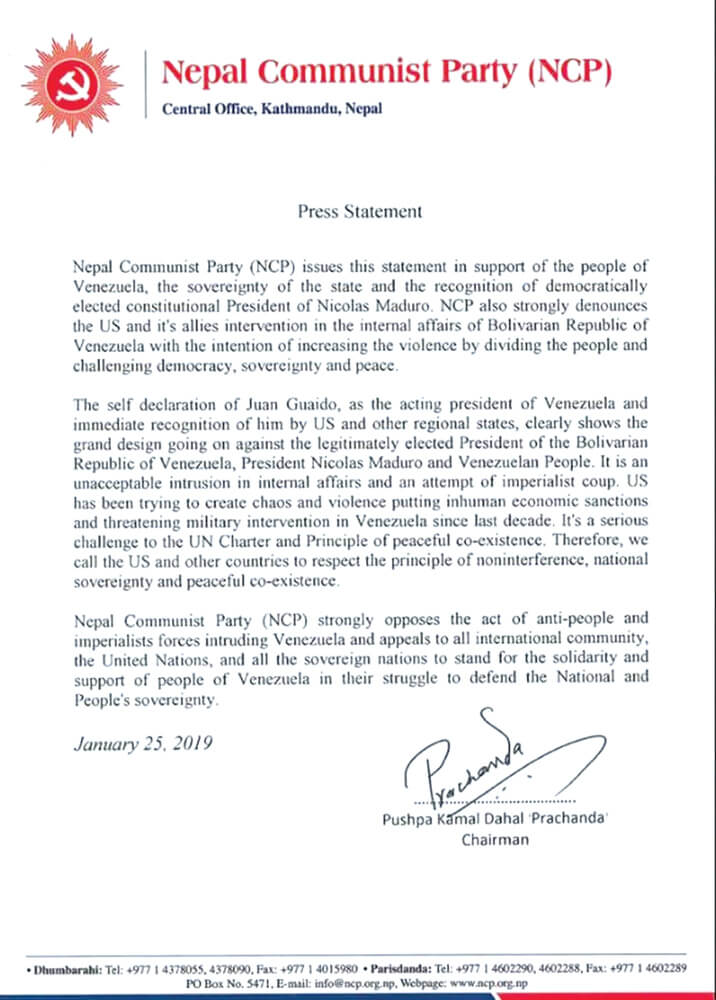A YAM BETWEEN 3 BOULDERS


Nothing has exposed the ideological chasm between the ex-UML and ex-Maoist components of the ruling Nepal Communist Party (NCP) more than the two widely divergent statements issued on Venezuela this week.
Who would have thought that the Bolivarian Republic of Venezuela would loom so large in exposing fissures in a government of a country on the other side of the world with which the Federal Democratic Republic of Nepal has no real strategic interests.
Read also:
Nepal now has to balance not just India and China, but also the West, Bhairaja Pandey
Eminently beneficial for India and Nepal, Ajit Baral
The Co-chair of the NCP and prime minister-in-waiting Pushpa Kamal Dahal fired off a statement in full support of the glorious revolutionary comrades under Nicolas Maduro, and denounced US intervention.
It has to be said that the US has indeed come across, as it has in the past, as a global bully throwing its weight around with sanctions and threats against a poor and badly-governed country. When will America learn to pick someone its size?
But Dahal made a boo-boo by aligning his party, and by association Nepal, needlessly in a power struggle reminiscent of the Cold War.
There were two problems with the NCP statement. First was the timing: why would Dahal want to issue it while his party co-chair Prime Minister K P Oli was in Davos trying hard to make a good impression on foreign investors?
Oli had admitted before he left that his job was to convince the international community and multinational companies that his government was ‘Communist’ only in name, and that Nepal was open for business. Even if Oli had been only partially successful in removing the stigma, Dahal’s communique firmly identified Nepal as an adherent of an obsolete ideology and a relic of the past.
The only explanation we can give to this juvenile behaviour is that Dahal has a sad case of FOMO. By launching a heat-seeking missile aimed at no one in particular, Dahal may also have been trying to re-establish his rather frayed Communist credentials. But the unnecessarily strong language denouncing American 'imperialism' which was creating 'chaos and violence’ was inappropriate, undiplomatic and counterproductive.
Oli looked uncharacteristically flummoxed when asked about Dahal's missive when he returned from Davos. The statement also came less than a month after Foreign Minister Pradeep Gyawali’s meeting with US Secretary of State Mike Pompeo in Washington DC during which the two discussed implementation of America’s $500 million assistance through the Millennium Challenge Corporation (MCC) Nepal Compact for road and power connectivity.
The two are also understood to have discussed America’s Indo-Pacific Strategy which, together with the MCC, are seen as a counter by China as a challenge to its Belt Road Initiative (BRI) which Nepal has signed on to. Gyawali trod a tightrope to balance the geostrategic interests of the two global powers, and clarified that Nepal was not going to join any US-led alliance in the Indo-Pacific.
The renaming of the US Pacific Command into Indo-Pacific Command last year, designating India as a Major Defence Partner, the joint Malabar 2017 exercise in the Indian Ocean involving the navies of India, Japan and the US, the revival of the Quad Alliance of Japan, Australia, the US and India as an effort to 'contain' China, are all indications that Sino-US competition is heating up in the region.
Asian countries may be nervous about China’s growing economic and political clout, but Beijing feels it is being encircled by America and its allies. Still, many Southeast and South Asian countries do not want to be forced to choose between America and China.
Which is what makes Dahal’s statement on Venezuela so damaging for Nepal at a time when the Foreign Ministry is trying to steer a neutral course that would benefit Nepal’s trade, investment and infrastructure. The Ministry's damage control this week was with a much more balanced statement saying Nepal respected the democratic will of the people of Venezuela, and opposed foreign interference.
During the war, as Chairman Prachanda Dahal famously paraphrased King Prithvi Narayan Shah to say that Nepal was “a dynamite between two boulders”. It seems he has not outgrown his penchant for hyperbole.
There was a time when Nepal just had to worry about balancing its giant northern and southern neighbours, but the world is now multi-polar and getting to be a much more complicated place. Our neighbours are drawn into a global power struggle, and being a yam between three boulders, Nepal has to be careful about how America’s increasingly erratic behaviour will affect its precarious equidistance between India and China.
A place to start would be to forge a united and coherent foreign policy strategy that prevents outside powers from using one or other party or faction in Nepal to push their strategic agenda.
10 years ago this week
Just as issue of Nepali Times deals with Nepal’s geopolitical dilemma, ten years ago in issue #436 of 30 January - 5 February 2009 Prashant Jha reported from New Delhi about how India had a ‘wait-and-watch’ policy towards the newly-elected Maoist government led by Prime Minister Pushpa Kamal Dahal. Excerpt:
'India is getting increasingly concerned about the slide in Nepal, but doesn't think it warrants a policy shift just yet. Indian officials admit that they are unhappy with the Maoists: "They have not delivered on their promises,"
one official told us, "their commitment to democracy seems doubtful. They are warming up to China. Not good signs."
But sources insist India continues to support the peace and constitution writing process and will not destabilise the present arrangement. "It will be good if non-Maoist actors add pressure on the Maoists. But we will not back any effort to topple the government right now," one senior official told Nepali Times.’





